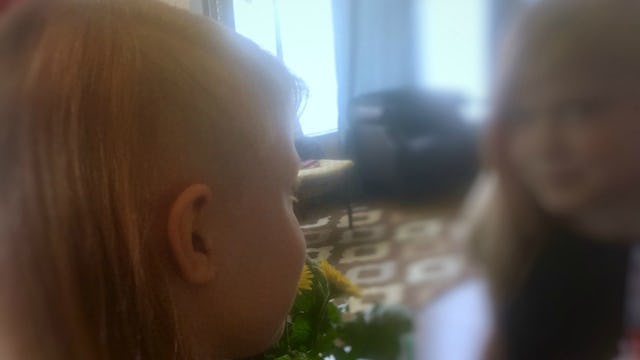I Tell My Child, 'Your Body Is Your Body,' And I Mean It

My 9-year-old daughter recently informed me that she wanted to shave her head. “Just part of it,” she explained, as she sectioned off a large chunk of hair on the side of her head to show me what she meant. My immediate reaction was to catch my breath and count to 3. I was not expecting this. But then I repeated what I have told her since the time she informed me she wanted to cut off all of her long blonde hair, at 4 years old:
“Your body is your body,” I told her. “Nobody gets to make decisions about your body except for you. Not even me.”
And then, “You’re beautiful, no matter what.”
Here’s the thing: I know my daughter will face a lifetime of people telling her how she should dress and wear her hair. She’ll hear these things from peers, from men, from society. She will be told how she should look, speak, and act in order to desirable; how she should sit, pose for photos, smile, and be sexy (or not too sexy).
In one million small moments, the world will try to convince her that her understanding of her beauty and worth is to be found in the perceptions of others rather than within herself. She will face a nonstop barrage of pressure to conform and make choices about her body that do not come from her heart, her wants, her needs, or her desires, but from what she perceives as “right” and “good” and “expected” in the eyes of others. I do not want to be the first person to teach her that she needs to bow to this pressure. I want to be the person who teaches her to fight against it.
I gave my daughter full autonomy over her own body when she was 4 years old. These words have become a mantra in my household: “Your body, your choice.” There have been times when this was difficult for me. When she decided to get her ears pierced, I agreed. When she wanted to start dyeing her hair fun colors, I said okay. When she wears an outfit I consider to be ugly and mismatched or when she wants to run around the house naked, I don’t say a word. When she decides that she doesn’t want to hug someone or says stop during a tickle fight, I listen.
I remind her constantly that she is the owner of her body, and that nobody has a right to decide what she does and does not do with it. I remind her that she should always look inward to make decisions about what feels comfortable to her and what she considers to be beautiful, to be affectionate, to be safe and loving. I instill in her the right to say yes and the right to say no, and most importantly, I instill in her that the answers to these questions always lie within herself and never in another person.
So last week, when my daughter decided she wanted to partially shave her head, I told her what I always tell her: “Your body, your choice.” It gave me anxiety to watch her do it. What if people were mean to her? What if she regretted it? But I also felt a fierce sense of pride in this 9-year-old girl who knew that some people might think her new hair was ugly or weird or different, but who didn’t let that stop her.
I felt confident in her ability to own this decision as her own, and I knew she would learn from it even if she woke up regretting it the next day. She checked in with herself and what she wanted first, and then made a thoughtful decision about her body from a place of power and alignment with her emerging values. She was owning her body and her ideal of beauty, and doing so with style and grace.
In the end, it’s just hair, and she’s only 9. There are no real repercussions to whether she shaves her whole head or dyes it hot pink, and to be fair, there would be no obvious repercussions to me telling her she couldn’t do any of those things either. But what we sometimes forget about parenting is that it’s all just practice for when they aren’t children anymore and have to face things as an adult.
I wonder now, how will my daughter respond when someone tells her that she needs to change, to compromise on her values or her comfort or her wants and needs and desires in order to make them happy? Will she have the strength to say no when she’s pressured to change her body or use it in ways that feel uncomfortable to her? Because this is not a question of if; it’s a question of when.
Our teenage girls don’t magically develop the strength to set boundaries, or stand up for themselves, or believe that they are beautiful no matter what. These are skills they won’t have when they are old enough to face these adult situations if we do not instill them in our girls when they are young.
What messages are you sending to your young girls about beauty and consent? What messages do you wish you had received as a little girl? When we challenge the messaging that is directed at girls, we allow them to grow to their full potential, into strong women who know their worth.
This article was originally published on